Our partnerships in Africa, the Caribbean, Central America and South East Asia provides our students with diverse opportunities.
Opportunities for MSN Majors
MSN Clinical Majors and Specialties
MSN students completing a nurse practitioner degree can expand their understanding of global health and disease, culture, history, ethics, safety, intercultural skills, development and health care delivery throughout the world.
MSN Non-Clinical APRN Majors
MSN students completing one of the non-clinical specialties of Nursing Education, Health Informatics, and Nursing and Health Care Leadership may explore with their advisors the possibility of completing a portion of their required practicum hours abroad. For example, working alongside a master teacher, work on an informatics project, or work with a health care administrator in another country.
Locations
Visit a link below to learn more about our global clinical experience locations:
-
Africa
-
Bugando Medical Center (MSN Clinical and DNP)
-
Kilema Hospital (ABSN)
-
Kilimanjaro Christian Medical University - College (MSN Non-Clinical)
-
Machame Lutheran Hospital (MSN Clincial)
-
Pasua and Majengo Public Health Clinics (MSN Clinical)
-
Teamwork City of Hope (ABSN and All Graduate Programs)
-
Teamwork City of Hope (ABSN and All Graduate Programs)
-
University of Rwanda College of Medicine and Health Sciences School of Nursing and Midwifery (All Graduate Programs)
-
-
Asia
-
Republic of the Philippines (ABSN)
-
-
Caribbean
-
Central America
-
Curamericas Global (ABSN, MSN, DNP, PhD)
-
Honduras (ABSN, MSN, DNP, PhD)
-
Africa
Bugando Medical Center | Mwanza, Tanzania
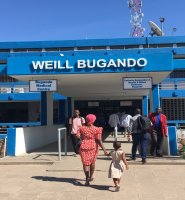 Bugando Medical Center is a referral, consultant and university teaching hospital in partnership with the government and Tanzania Episcopal Conference of the Catholic Bishops of Tanzania. Located in Mwanza, Tanzania's second-largest city, on the shores of Lake Victoria and surrounded by hills. The new radiotherapy center located in the state-of-the-art Oncology Wing of the hospital, makes Bugando the regional hub for cancer treatment and second established Oncology Centre in the country. While in Tanzania, students work alongside Dr. Kristin Schroeder, a Duke Pediatric Hematologist and Oncologist with specialization in neuro-oncology and co-founder of iCCARE which is working to improve the outcomes of cancer patients in Western Tanzania. This is a great site for Oncology Nurse Practitioner students.
Bugando Medical Center is a referral, consultant and university teaching hospital in partnership with the government and Tanzania Episcopal Conference of the Catholic Bishops of Tanzania. Located in Mwanza, Tanzania's second-largest city, on the shores of Lake Victoria and surrounded by hills. The new radiotherapy center located in the state-of-the-art Oncology Wing of the hospital, makes Bugando the regional hub for cancer treatment and second established Oncology Centre in the country. While in Tanzania, students work alongside Dr. Kristin Schroeder, a Duke Pediatric Hematologist and Oncologist with specialization in neuro-oncology and co-founder of iCCARE which is working to improve the outcomes of cancer patients in Western Tanzania. This is a great site for Oncology Nurse Practitioner students.
Visit this link to watch a video to learn more.
Kilema Hospital | Tanzania
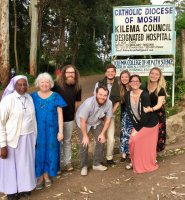 Kilema Hospital is situated in the Moshi region of Tanzania on the slopes of Mt. Kilimanjaro. It is run by the Sisters of Our Lady of Kilimanjaro and became a District Designated Hospital in 1984. Serving a catchment of over 228,000 people, Kilema Hospital provides general medical, obstetric, and surgical services as well as primary health care. Clinical groups of ABSN students work under the supervision of the Kilema Hospital staff. Clinical activities may include: rotations through the hospital or outpatient clinics with work in reproductive health, pediatric immunizations, HIV/AIDS, adolescent health and other infectious diseases as well as completion of a community health assessment. Students learn about the cultural practices of patients and their families and learn basic Swahili. We are currently working on opening this site for graduate NP students as well.
Kilema Hospital is situated in the Moshi region of Tanzania on the slopes of Mt. Kilimanjaro. It is run by the Sisters of Our Lady of Kilimanjaro and became a District Designated Hospital in 1984. Serving a catchment of over 228,000 people, Kilema Hospital provides general medical, obstetric, and surgical services as well as primary health care. Clinical groups of ABSN students work under the supervision of the Kilema Hospital staff. Clinical activities may include: rotations through the hospital or outpatient clinics with work in reproductive health, pediatric immunizations, HIV/AIDS, adolescent health and other infectious diseases as well as completion of a community health assessment. Students learn about the cultural practices of patients and their families and learn basic Swahili. We are currently working on opening this site for graduate NP students as well.
Kilimanjaro Christian Medical University - College (KCMU) | Moshi, Tanzania
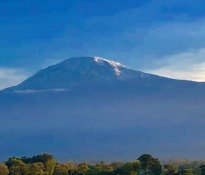 KCMU, located in Moshi, Tanzania, is a Christian University that aims to be a center of excellence in teaching, research, and the development of health care providers. The Faculty of Nursing offers a three-year undergraduate program leading to the award of a Bachelor of Science in Nursing. The program aims to educate and produce nurses and midwives poised to address the present and future needs of Tanzanians. Faculty members work with DUSON education students as mentors for classroom teaching.
KCMU, located in Moshi, Tanzania, is a Christian University that aims to be a center of excellence in teaching, research, and the development of health care providers. The Faculty of Nursing offers a three-year undergraduate program leading to the award of a Bachelor of Science in Nursing. The program aims to educate and produce nurses and midwives poised to address the present and future needs of Tanzanians. Faculty members work with DUSON education students as mentors for classroom teaching.
Machame Lutheran Hospital | Near Moshi, Tanzania
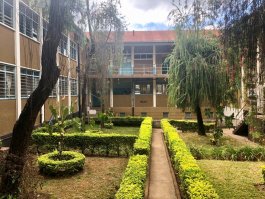 Machame Lutheran Hospital is located near the Machame gate of Mt. Kilimanjaro and for many years the hospital served as the primary referral and specialist center for the region. Today, it is a 150-bed general medical-surgical community hospital serving the greater Kilimanjaro area. Services and programs include outpatient and specialty clinics, diagnostics, maternal and child health, orthopedics, testing, counseling and treatment related to HIV-AIDS, hospice, palliative and home care. For decades, medical and nursing students from around the world have stayed in the Machame guest house on the hospital grounds while learning about tropical medicine, public and community health, and health care in a resource limited environment. Nurse practitioner students are assigned to work collaboratively with the health care team to meet learning needs while simultaneously providing supervised care to patients with many diverse acute and chronic health conditions, many not regularly seen in the U.S.
Machame Lutheran Hospital is located near the Machame gate of Mt. Kilimanjaro and for many years the hospital served as the primary referral and specialist center for the region. Today, it is a 150-bed general medical-surgical community hospital serving the greater Kilimanjaro area. Services and programs include outpatient and specialty clinics, diagnostics, maternal and child health, orthopedics, testing, counseling and treatment related to HIV-AIDS, hospice, palliative and home care. For decades, medical and nursing students from around the world have stayed in the Machame guest house on the hospital grounds while learning about tropical medicine, public and community health, and health care in a resource limited environment. Nurse practitioner students are assigned to work collaboratively with the health care team to meet learning needs while simultaneously providing supervised care to patients with many diverse acute and chronic health conditions, many not regularly seen in the U.S.
Visit this link to watch a video to learn more.
Pasua and Majengo Public Health Clinics | Moshi, Tanzania
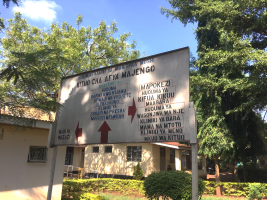 In Moshi, Nurse practitioner students are assigned to a nearby community-based clinic to work collaboratively with the health care team to meet learning needs while simultaneously providing supervised care to patients with many diverse acute and chronic health conditions, many not regularly seen in the U.S. Clinical activities may include rotations through the outpatient clinics with work in reproductive health, pediatric immunizations, HIV/AIDS, adolescent health and other infectious diseases. Students learn about the cultural practices of patients and their families and learn basic Swahili.
In Moshi, Nurse practitioner students are assigned to a nearby community-based clinic to work collaboratively with the health care team to meet learning needs while simultaneously providing supervised care to patients with many diverse acute and chronic health conditions, many not regularly seen in the U.S. Clinical activities may include rotations through the outpatient clinics with work in reproductive health, pediatric immunizations, HIV/AIDS, adolescent health and other infectious diseases. Students learn about the cultural practices of patients and their families and learn basic Swahili.
Visit this link to watch a video to learn more.
Teamwork City of Hope | Tanzania
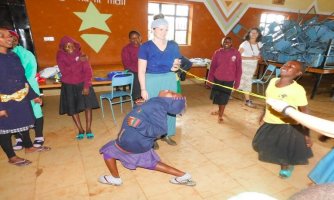 A local Tanzanian initiative that aims to raise the leaders of tomorrow by giving orphaned children a safe home, quality education and a promising future. The compound is a self-sustaining campus in a remote, rural setting (Ntagatcha) near Tarime in the Mara district of Tanzania. The campus includes a children’s home, a primary and secondary school, a guest house, a medical center and agricultural initiatives. Nursing students implement community health principles and practices, including health promotion and disease prevention interventions, with the children at TCOH and community members at a small clinic nearby. At the same time, they will learn about cultural practices and basic Swahili. Several DNP students have completed projects at TCOH.
A local Tanzanian initiative that aims to raise the leaders of tomorrow by giving orphaned children a safe home, quality education and a promising future. The compound is a self-sustaining campus in a remote, rural setting (Ntagatcha) near Tarime in the Mara district of Tanzania. The campus includes a children’s home, a primary and secondary school, a guest house, a medical center and agricultural initiatives. Nursing students implement community health principles and practices, including health promotion and disease prevention interventions, with the children at TCOH and community members at a small clinic nearby. At the same time, they will learn about cultural practices and basic Swahili. Several DNP students have completed projects at TCOH.
Visit this link to watch a video to learn more.
University of Rwanda Rwamagana Hospital | Rwanda
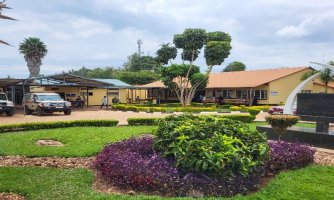 The Rwamagana Level Two Teaching Hospital is a public Hospital located in Eastern Province, Rwamagana District, 60 km from Kigali. It was founded in 1949 as a dispensary for people who worked in mines. In 1952, it became a public district hospital. It has the capacity of 220 beds and offers a variety of outpatient, inpatient services, and mentorship and oversight of health centers.
The Rwamagana Level Two Teaching Hospital is a public Hospital located in Eastern Province, Rwamagana District, 60 km from Kigali. It was founded in 1949 as a dispensary for people who worked in mines. In 1952, it became a public district hospital. It has the capacity of 220 beds and offers a variety of outpatient, inpatient services, and mentorship and oversight of health centers.
Clinical groups of ABSN students work under the supervision of the Rwamagana Hospital staff. Clinical activities may include rotations through the outpatient on-site clinics and visits in the community with an assigned environment officer and/or with community health workers where student can help provide any health promotion teaching. Students also learn about the cultural practices of patients and their families.
University of Rwanda College of Medicine and Health Science of Nursing and Midwifery | Rwanda
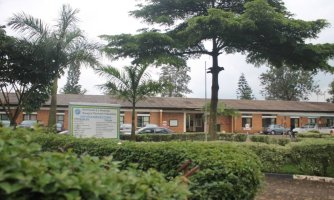 The College of Medicine and Health Sciences is part of the University of Rwanda; whose formation was put in law October 2013.
The College of Medicine and Health Sciences is part of the University of Rwanda; whose formation was put in law October 2013.
The College, also known as UR-CMHS, has a central role to play in the social and economic development of the nation through training of medical doctors and health professionals.
The College engages in capacity building relevant to this cause by spearheading health training initiatives and capacity building, through robust and relevant research programs. The School of Nursing and Midwifery, occupies a unique position in the education of nurses and midwives in Rwanda, making a positive impact on the quality of the healthcare workforce in the country.
Nurse practitioner students are assigned to work collaboratively with the UR-CMHS faculty and/or the health care team to meet learning needs while simultaneously providing supervised care to patients with many diverse acute and chronic health conditions, many not regularly seen in the U.S.
Asia
Republic of the Philippines
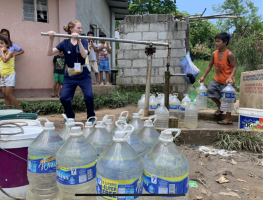 The Republic of the Philippines is an archipelagic country in Southeast Asia situated in the western Pacific Ocean. This exciting program engages Duke and University of Santo Tomas (UST) nursing students in community and public health rotations in both urban and rural settings in the Philippines. Clinical sub-groups comprised of Duke and UST students work with and learn from each other as they participate in observation and hands-on clinical experiences in Manila as well as conduct community and family health assessments, and work closely with families on health promotion/disease prevention, and organize a community health fair in a rural community such as Plaridel, Bulacan, Floridablanca, Pampanga.
The Republic of the Philippines is an archipelagic country in Southeast Asia situated in the western Pacific Ocean. This exciting program engages Duke and University of Santo Tomas (UST) nursing students in community and public health rotations in both urban and rural settings in the Philippines. Clinical sub-groups comprised of Duke and UST students work with and learn from each other as they participate in observation and hands-on clinical experiences in Manila as well as conduct community and family health assessments, and work closely with families on health promotion/disease prevention, and organize a community health fair in a rural community such as Plaridel, Bulacan, Floridablanca, Pampanga.
Caribbean
Barbados Community College and Barbados Ministry of Health
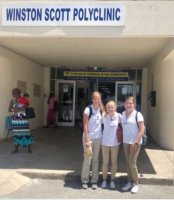 In Barbados, ABSN students are registered at Barbados Community College and assigned to a polyclinic to observe and/or provide hands-on care under the supervision of its staff. Polyclinics are multiservice outpatient facilities that provide public health and primary care clinical services to citizens on the island. Operated by the Ministry of Health, services may include: antenatal/postnatal, pediatric, mental health, chronic disease management, dental, school health, counseling, nutrition, ophthalmology, physiotherapy, environmental health services and community visits/home care.
In Barbados, ABSN students are registered at Barbados Community College and assigned to a polyclinic to observe and/or provide hands-on care under the supervision of its staff. Polyclinics are multiservice outpatient facilities that provide public health and primary care clinical services to citizens on the island. Operated by the Ministry of Health, services may include: antenatal/postnatal, pediatric, mental health, chronic disease management, dental, school health, counseling, nutrition, ophthalmology, physiotherapy, environmental health services and community visits/home care.
Barbados Community College Division of Health Sciences
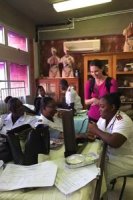 Barbados Community College (BCC), located in Bridgetown, Barbados, is a dynamic center of learning that provides a range of courses and programs of study. The Department of Nursing offers a four-year undergraduate program leading to the award of a Bachelor of Science in nursing degree as well as a post-associate bachelor of science in nursing degree program for students who have completed the associate degree in nursing or the equivalent. The program aims to educate and produce nurses and midwives who are poised to address the present and future needs of Barbadians.
Barbados Community College (BCC), located in Bridgetown, Barbados, is a dynamic center of learning that provides a range of courses and programs of study. The Department of Nursing offers a four-year undergraduate program leading to the award of a Bachelor of Science in nursing degree as well as a post-associate bachelor of science in nursing degree program for students who have completed the associate degree in nursing or the equivalent. The program aims to educate and produce nurses and midwives who are poised to address the present and future needs of Barbadians.
Central America
Curamericas Global | Guatemala
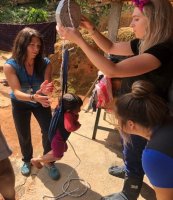 Guatemala, a Central American country south of Mexico, is home to volcanoes, rainforests and ancient Mayan sites. Since 2002, Curamericas Global has been working in partnership with Curamericas-Guatemala to reduce the rates of infant, child, and maternal mortality in the highlands of northwest Guatemala. Students travel to one of the most isolated and impoverished areas of Guatemala. These areas are very rural with limited accessibility. The Casas Maternas centers serve women beyond the reaches of the immediate community; 35% of the deliveries in the Casas Maternas are for women from neighboring communities who travel for the better healthcare, health education and community empowerment.
Guatemala, a Central American country south of Mexico, is home to volcanoes, rainforests and ancient Mayan sites. Since 2002, Curamericas Global has been working in partnership with Curamericas-Guatemala to reduce the rates of infant, child, and maternal mortality in the highlands of northwest Guatemala. Students travel to one of the most isolated and impoverished areas of Guatemala. These areas are very rural with limited accessibility. The Casas Maternas centers serve women beyond the reaches of the immediate community; 35% of the deliveries in the Casas Maternas are for women from neighboring communities who travel for the better healthcare, health education and community empowerment.
Visit this link to watch a video to learn more.
Honduras
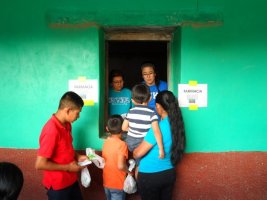 Offered through the Duke University School of Medicine in conjunction with Heifer International, this variable – credit -course is offered each spring and includes a weekly two-hour class (topics: culture, customs, global health and Spanish language) and a 10-day outreach experience (occurs in mid-April/early May) to Honduras. A multidisciplinary team comprised of faculty, students and staff from the medical, nursing, physician’s assistant, pharmacy and physical therapy programs learn and work together to provide outpatient medical care and health education to indigenous people in isolated mountain communities.
Offered through the Duke University School of Medicine in conjunction with Heifer International, this variable – credit -course is offered each spring and includes a weekly two-hour class (topics: culture, customs, global health and Spanish language) and a 10-day outreach experience (occurs in mid-April/early May) to Honduras. A multidisciplinary team comprised of faculty, students and staff from the medical, nursing, physician’s assistant, pharmacy and physical therapy programs learn and work together to provide outpatient medical care and health education to indigenous people in isolated mountain communities.
Interdis 422C - Exploring Medicine in Other Cultures: This opportunity for graduate students is unique in that the fees for the experience are established annually by the Board Trustees and include transportation, lodging, global partner fees, cultural enrichment activities and meals. A multi-disciplinary team comprised of faculty, students and staff from the medical, nursing, physician’s assistance, pharmacy and physical therapy programs learn and work together to provide outpatient medical care and health education to indigenous people in isolated mountain communities. Spanish proficiency is recommended but not Spanish proficiency is recommended but not required.